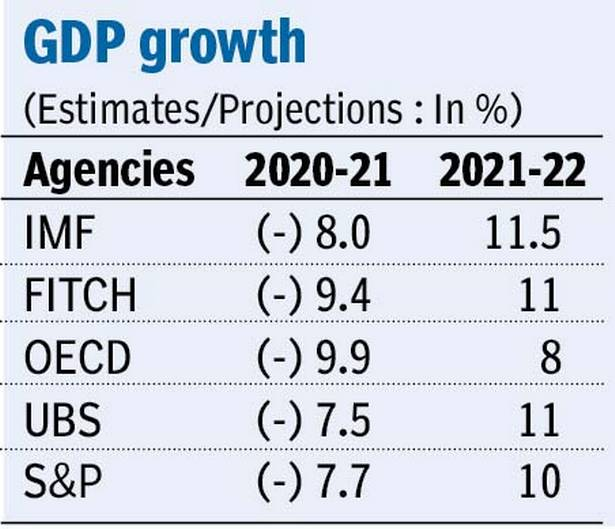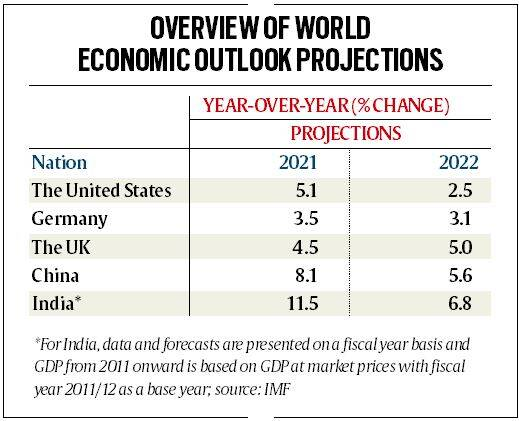Indian Economy
World Economic Outlook: IMF
- 27 Jan 2021
- 5 min read
Why in News
Recently, the latest World Economic Outlook of the International Monetary Fund (IMF) has estimated that India’s Gross Domestic Product (GDP) will grow by 11.5% in the Financial Year (FY) 2021-22.
Key Points
- India Specific Projections:
- FY 2020-21: For the current fiscal, the IMF had forecast a record 10.3% contraction.
- FY 2021-22: For the next fiscal, starting from April 1st, GDP growth projection is at 11.5%, 2.7% higher than the projection made in October, 2020.
- Last October, the IMF had projected an 8.8% real GDP growth for India in FY 2021-22, highest globally.
- FY 2022-23: In FY 2022-23, the economy will likely grow 6.8%.
- Governments Projection for 2020-21:
- The latest revision for the current fiscal is higher than the government’s first advance estimate of 7.7% and also the RBI’s estimate of 7.5%.
- Reason for Increase in the Estimates by IMF:
- India has taken very decisive action, very decisive steps to deal with the pandemic and to deal with the economic consequences of it.
- Government Measures to Deal With the Pandemic:
- Reserve Bank of India’s Covid19 Economic Relief Package
- Pradhan Mantri Garib Kalyan Yojana: The government announced Rs 1.70 lakh crore relief package under the newly framed Pradhan Mantri Garib Kalyan Yojana for the poor to help them fight the battle against covid-19.
- Atmanirbhar Bharat Abhiyan (or Self-reliant India Mission): The Self-Reliant India Mission aims towards cutting down import dependence by focussing on substitution while improving safety compliance and quality goods to gain global market share.
- Government announced liquidity measures for businesses, especially Micro, Small and Medium enterprises (MSMEs) under the Atmanirbhar Bharat Abhiyan.
- Global Projections:

- Global Economy:
- The global economy is projected to grow 5.5% in 2021 and 4.2% in 2022.
- The IMF also saw a narrower 3.5% contraction in world output in 2020 as opposed to a 4.4% decline seen earlier.
- It attributed the 0.3% point upward revision for 2021 to “expectations of a vaccine-powered strengthening of activity later in the year and additional policy support in a few large economies.
- The global economy is projected to grow 5.5% in 2021 and 4.2% in 2022.
- Global Economy:
- Global Trade Volumes:
- They are forecasted to grow about 8% in 2021.
- The IMF expects oil prices to rise in 2021 by just over 20% from the low base for 2020 but they will still remain well below their average for 2019.
- Non-oil commodity prices are also expected to increase with those of metals, in particular, projected to accelerate strongly in 2021.
- Other Economies with High percentage of Growth:
- China would grow 8.1% in 2021, followed by Spain (5.9%) and France (5.5 %).
- China, which was the only major country to register a growth rate of 2.3 % in 2020, will expand 5.6% in 2022.
- Increased Inequality:
- The report highlighted the pandemic-induced acceleration in inequality by reiterating that close to 90 million people are likely to fall below the extreme poverty threshold during 2020-21 as workers with less education, women, youth, those in contact-intensive sectors, and those informally employed suffer disproportionate livelihood and income losses.
- The pandemic is expected to reverse the progress made in poverty reduction across the past two decades.
- It can be noted that recently, the Inequality Virus Report, released by Oxfam International, has also found that the Covid pandemic deeply increased the existing inequalities in India and around the world.
International Monetary Fund
- The IMF was set up along with the World Bank after the Second World War to assist in the reconstruction of war-ravaged countries.
- The two organisations were agreed to be set up at a conference in Bretton Woods in the US. Hence, they are known as the Bretton Woods twins.
- Created in 1945, the IMF is governed by and accountable to the 189 countries that make up its near-global membership.India joined on December 27, 1945.
- The IMF's primary purpose is to ensure the stability of the international monetary system — the system of exchange rates and international payments that enables countries (and their citizens) to transact with each other.
- The Fund's mandate was updated in 2012 to include all macroeconomic and financial sector issues that bear on global stability.
- Other Reports by IMF:




